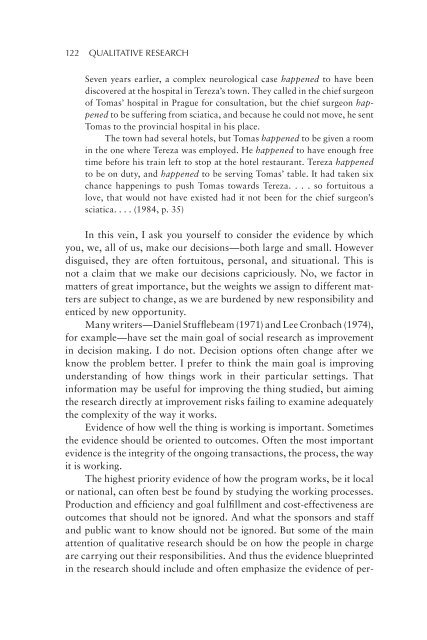How Things Work - Doha Academy of Tertiary Studies
How Things Work - Doha Academy of Tertiary Studies
How Things Work - Doha Academy of Tertiary Studies
Create successful ePaper yourself
Turn your PDF publications into a flip-book with our unique Google optimized e-Paper software.
122 QUaLItatIVe ReSeaRCH<br />
Seven years earlier, a complex neurological case happened to have been<br />
discovered at the hospital in Tereza’s town. They called in the chief surgeon<br />
<strong>of</strong> Tomas’ hospital in Prague for consultation, but the chief surgeon happened<br />
to be suffering from sciatica, and because he could not move, he sent<br />
Tomas to the provincial hospital in his place.<br />
The town had several hotels, but Tomas happened to be given a room<br />
in the one where Tereza was employed. He happened to have enough free<br />
time before his train left to stop at the hotel restaurant. Tereza happened<br />
to be on duty, and happened to be serving Tomas’ table. It had taken six<br />
chance happenings to push Tomas towards Tereza. . . . so fortuitous a<br />
love, that would not have existed had it not been for the chief surgeon’s<br />
sciatica. . . . (1984, p. 35)<br />
In this vein, I ask you yourself to consider the evidence by which<br />
you, we, all <strong>of</strong> us, make our decisions—both large and small. <strong>How</strong>ever<br />
disguised, they are <strong>of</strong>ten fortuitous, personal, and situational. This is<br />
not a claim that we make our decisions capriciously. No, we factor in<br />
matters <strong>of</strong> great importance, but the weights we assign to different matters<br />
are subject to change, as we are burdened by new responsibility and<br />
enticed by new opportunity.<br />
Many writers— Daniel Stufflebeam (1971) and Lee Cronbach (1974),<br />
for example—have set the main goal <strong>of</strong> social research as improvement<br />
in decision making. I do not. Decision options <strong>of</strong>ten change after we<br />
know the problem better. I prefer to think the main goal is improving<br />
understanding <strong>of</strong> how things work in their particular settings. That<br />
information may be useful for improving the thing studied, but aiming<br />
the research directly at improvement risks failing to examine adequately<br />
the complexity <strong>of</strong> the way it works.<br />
Evidence <strong>of</strong> how well the thing is working is important. Sometimes<br />
the evidence should be oriented to outcomes. Often the most important<br />
evidence is the integrity <strong>of</strong> the ongoing transactions, the process, the way<br />
it is working.<br />
The highest priority evidence <strong>of</strong> how the program works, be it local<br />
or national, can <strong>of</strong>ten best be found by studying the working processes.<br />
Production and efficiency and goal fulfillment and cost- effectiveness are<br />
outcomes that should not be ignored. And what the sponsors and staff<br />
and public want to know should not be ignored. But some <strong>of</strong> the main<br />
attention <strong>of</strong> qualitative research should be on how the people in charge<br />
are carrying out their responsibilities. And thus the evidence blueprinted<br />
in the research should include and <strong>of</strong>ten emphasize the evidence <strong>of</strong> per-

















